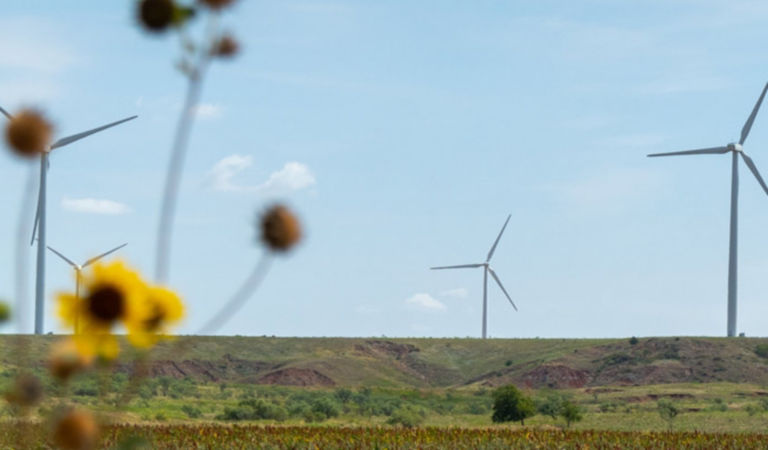FAQs about renewables VPPAs
Q: What are VPPAs?
Beth: A VPPA is a long-term bilateral contract for renewable energy and a strategic means for the buyer to support the addition of renewable energy onto a local power grid. Like leasing office space in a building prior to construction, VPPAs are typically signed in advance of construction of power-generation infrastructure (in our case, wind turbines). While not applicable to our arrangement, some VPPAs allow a developer to secure financing for construction, meaning that without the VPPA, a given renewables project would either not go forward or would be smaller in scale and, therefore, generate less energy.
Q: What are the benefits of VPPAs?
Jim: Renewables VPPAs are a meaningful way to decarbonize energy production and consumption. Companies generally cannot purchase renewable energy directly from utilities, as few purchase options exist and it is difficult to produce enough electricity on-site. For example, there is not enough roof space on the buildings we lease to install the solar panels needed to meet our power demands. A company can then rightfully say it sources a certain percentage of its power from renewable sources. For developers, VPPAs provide financing for renewables projects and assurance they can achieve necessary return hurdles.
Q: How do VPPAs work in the United States?
Beth: Electricity generated from a power plant is transmitted to the grid and blended with power from other sources (gas, coal, nuclear, etc.). Since the power from a specific wind or solar farm cannot be attributed to an end user (unless the user installs enough distributed power to bypass the grid), the US has incorporated a system of renewable energy certificates (RECs). Every megawatt hour from a wind or solar farm produces one REC. In a VPPA, a company receives RECs from the contracted renewables developer and can either resell the RECs for financial gain or retire them against its corporate electricity usage. Upon retiring their RECs, a company can rightfully claim a portion of its power is generated from renewables.
About our VPPA with Enel Green Power
Q: What are the details of Wellington’s VPPA?
Jim: Wellington is contracting 11 megawatts (MW) of capacity at Enel’s Rockhaven Wind Project in Oklahoma. The arrangement, which is subject to definitive agreements, covers approximately 48 GWh of wind energy annually, with associated RECs that are equivalent to avoiding 30,000 tons of CO2 in the atmosphere each year. Wellington’s average annual electricity usage from our US corporate offices is about 15,000 MWh. We have approximately 2,300 US-based employees. Based on the national average for household electricity usage according to the US Energy Information Administration, our US employees use approximately 25,000 MWh annually. This brings our total US corporate and employee usage to about 40,000 MWh of electricity per year.
We wanted to account for future headcount growth, potential office expansion, and increased household electricity usage given our new hybrid working model and projections for increased adoption of electric vehicles and electric heat pumps. To be sure, some employee households will use more electricity than the average and some will use less, but we believe this estimate is sufficient as most of our US employees live in the Northeast, where households consume 25% less than the national average.
Q: Who is Enel Green Power and why did we choose to partner with them?
Lucy: Enel Green Power is the renewable business line of Enel North America and a leading operator of renewable energy plants. In North America, Enel operates 68 plants, with an installed capacity of eight GW, powered by renewable wind, geothermal, and solar energy. Globally, Enel manages more than 1,200 plants on five continents, has assets in operation or under construction in 21 countries, and development activities in an additional five.1 We chose Enel, in part, because we believe the company would be an effective thought partner as we seek sustainable electricity-generation solutions in our non-US office locations.
Q: Does home electricity usage from this VPPA only apply in the US? If so, why?
Lucy: Yes. Regulatory restrictions preclude us from matching our electricity usage outside of the US. RECs are a US mechanism; we cannot apply them to offset our non-US electricity usage. We continue to partner with our property owners to source renewable energy and will invest in REC equivalents where possible.
Q: What is distinctive about Wellington’s VPPA?
Beth: We are the first asset management firm, to our knowledge, to have signed a VPPA matching 100% of our firm’s US corporate electricity usage with renewable energy. What’s more, we believe we are one of the first companies in the world (in any industry) to match our US employees’ personal home electricity usage with renewable energy. Having adopted a hybrid-work model, we expect most Wellington employees will work from home more often, making our commitment even more significant. We hope our VPPA sets a new standard, inspiring other asset management firms to make similar commitments, develop credible energy transition strategies, and lower their carbon footprint.













